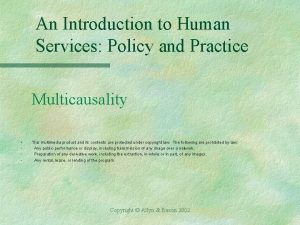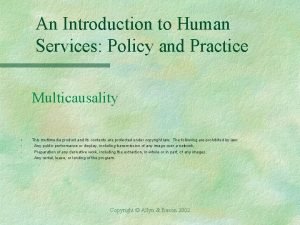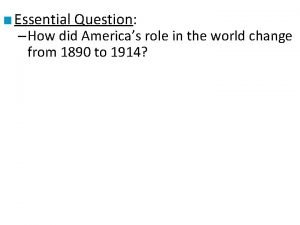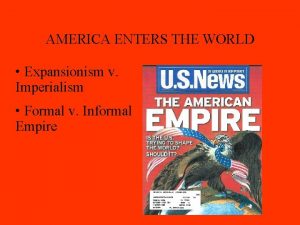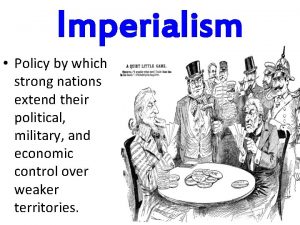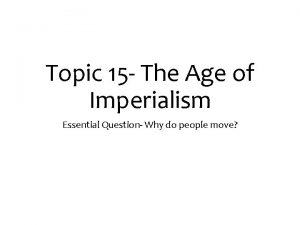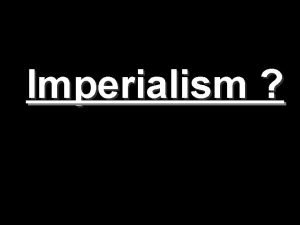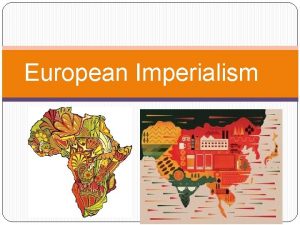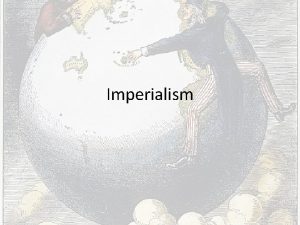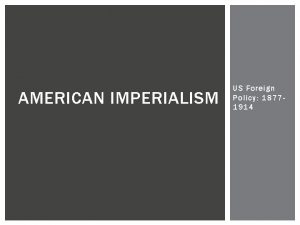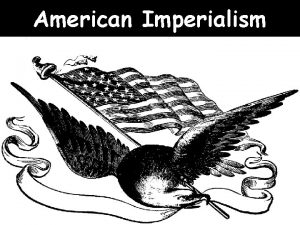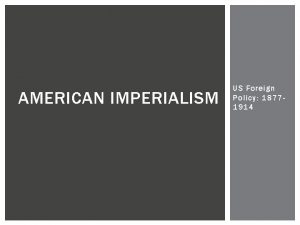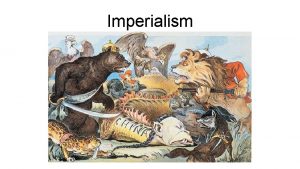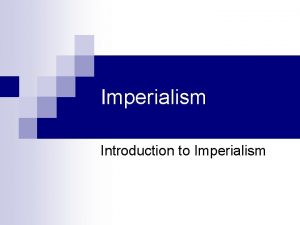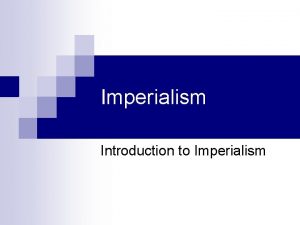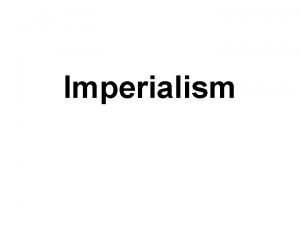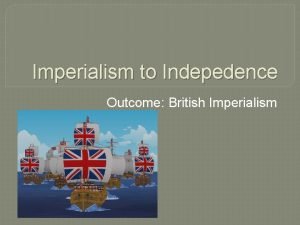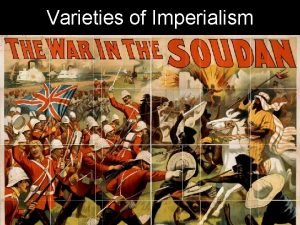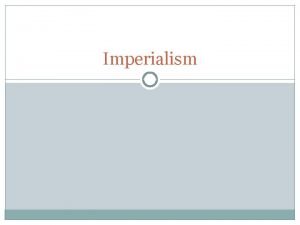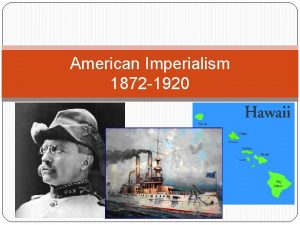Imperialism I Introduction to Imperialism The policy practice



























- Slides: 27

Imperialism

I. Introduction to Imperialism • • • The policy, practice, or advocacy of extending the power and dominion of a nation especially by direct territorial acquisitions or by gaining indirect control over the political or economic life of other areas; The extension or imposition of power, authority, or influence. - Merriam-Webster Online Dictionary Imperialism is also known as colonialism of neocolonialism.

I. Introduction to Imperialism: Causes of Imperialism • 1. 2. 3. 4. 5. 6. 6 major causes: Economic Political Military Cultural Religious Social Darwinism

I. Introduction to Imperialism: Causes of Imperialism 1. Economic • • • The need for raw materials / natural resources for Industrialization The need for agricultural products The need for guaranteed markets for mass produced goods Cheap labor = cheaper products / cheaper food / cheaper commodities Examples: The British in India, the Caribbean islands, Africa / France in Vietnam, Haiti, Africa / Spain in the Americas & the Caribbean

I. Introduction to Imperialism: Causes of Imperialism • • • A major impetus for the “new imperialism” (1870 -1914) was the Industrial Revolution - The process of change from an agrarian, handicraft economy to one dominated by industry and machine manufacture. This process began in England in the 18 th century and from there spread to other parts of the world. To sustain industrialization, a steady supply of raw materials such as coal, iron, steel, nickel, bauxite, cotton, oil are necessary. Early industrial leaders such as Great Britain, Belgium, France created or expanded an already-existing imperial system. A result of the Industrial Revolution was the mass production of goods. National economies could not absorb the increased supply of goods. Capitalists looked to expand their markets > another reason for colonies.

I. Introduction to Imperialism: Causes of Imperialism 2. Political • • When the dominant country imposes its political values and system on subordinate countries. Example: The Soviet Union imposing Communist government on Eastern European states (1945 -1989)

I. Introduction to Imperialism: Causes of Imperialism 3. Military • • • The United States has over 730 military bases and installations in over 50 countries. (2003) American forces are deployed in roughly 130 countries around the world, performing a variety of duties from combat to peacekeeping to training foreign militaries, according to Global. Security. org, a defense-oriented think tank. (2007) The “War on Terror” / protection of “American national interests”

I. Introduction to Imperialism: Causes of Imperialism

I. Introduction to Imperialism: Causes of Imperialism 4. Cultural • The use of political and economic power to exalt and spread the values of a foreign culture at the expense of a native culture. - John Tomlinson, Cultural Imperialism

I. Introduction to Imperialism: Cultural Imperialism • • Spain imposed its language, religion and culture throughout the Americas and the Caribbean. France promoted its language and culture throughout Europe and imposed it on its colonies in Africa, Southeast Asia, the Middle East and the Caribbean. English became the international language, surpassing French when the British became the world’s most powerful nation in the 18 th century. Because of the superpower status of the U. S. , English continues to be the dominant world language. Russian language and customs were imposed on a diverse group of people from Muslims in Central Asia and the Caucasus to Hungarians and other Eastern Europeans.

I. Introduction to Imperialism: Cultural Imperialism • The United States is accused of spreading “American values” throughout the world through its: -music and film industry -news media (CNN) -fast-food industry (Mc. Donald’s, Pizza Hut, Starbucks) - fashion industry

American Cultural Imperialism? • • On an average day in 2007, the company serves nearly serving 52 million people in more than 100 countries. By the turn of the 21 st century there were more than 850 Mc. Donald's restaurants in France, employing over 30, 000 people.

American Cultural Imperialism? In China (2002): • • 80 Mc. Donald's in Beijing alone The number of Kentucky Fried Chicken outlets has increased by 100 a year for the last 2 years, to about 600. Shanghai and Beijing each have more than two dozen Starbucks. Most Chinese never drank coffee until Starbucks came to town in 1999. "Chinese people these days have a very positive impression of American commercial culture and popular culture. " - Victor Yuan, president of Horizon. “Buicks, Starbucks and Fried Chicken. Still China? ” Elisabeth Rosenthal New York Times, February 25, 2002.

American Cultural Imperialism? • • • "Calling for political independence from the U. S. is one thing, and liking American brands is another. Of course I like IBM, Dell, Microsoft, Starbucks, and Coke. " Park Young Hoon, South Korea. "Yemeni students were out burning the American flag, chanting 'kill the Americans"' in early March, notes Jack Valenti, CEO of the Motion Picture Association of America. "As soon as theaters opened at 7 p. m. , bingo, they were all in there. “ Ahmad Tarouat, a 23 -year-old Parisian salesman, may insist that he will never ingest a Big Mac because "Mc. Donald's stands for American imperialism, " but he seems oblivious to the origin of the Nike sneakers on his feet or the pack of Marlboro Lights in his hands. - Brands in an Age of Anti-Americanism, August 4, 2003. http: //www. businessweek. com/magazine/content/03_31/b 3844011_mz 046. htm

American Cultural Imperialism? • According to Business Week, out of the top 100 most valuable global brands, 62 are from the USA, including 8 of the top 10. (2003)

How Countries Counter “Cultural Imperialism” • European Union - DIRECTIVE 89/552/EEC "TELEVISION WITHOUT FRONTIERS" (1989) - at least 50% of broadcast time must be devoted to programs of European origin. -The threat is seen to derive from English language services and productions originating from the United States, not England--in that only the United States is considered to have film and television industries organized on a scale large enough to take advantage of the single market.

How Countries Counter “Cultural Imperialism” • • France has gone the farthest in implementing the Directive. France – battling "American cultural imperialism. . " France currently requires that no more than 40% of films shown in the country are of non-European origin.

The Rise of Asian Cultural Imperialism? • Asian countries are making a large mark on the film industry: - Whereas Hollywood releases about 250 commercial films a year, India alone cranks out 800 to 900 (most of them are low- budget productions). - The Chinese film "Crouching Tiger, Hidden Dragon" has grossed more than $100 million in the United States alone — the first foreign-language film to take in that kind of cash. Tom Plate, “Hollywood Faces New Competition: World Film Industry Is Globalization at Its Best. ” 8/29/02 http: //www. international. ucla. edu/bcir/news/article. asp? parentid=2059

I. Introduction to Imperialism: Causes of Imperialism I. Introduction to Imperialism: Causes 5. Religious of Imperialism • • • Spread of Islam by Arab armies during the 7 th-13 th centuries. Spread of Christianity by Spain & Portugal in the Americas Spread of Christianity by Britain, France, Belgium in Africa

I. Introduction to Imperialism: Causes of Imperialism 6. Social Darwinism • • • Justification for imperialism derived from the teachings of Charles Darwin on natural selection and the survival of the fittest. Justified the overseas expansion of European nations by claiming racial superiority over the non white people in Africa, Asia and Latin America. Countries that proved to be more powerful and more civilized had the right and the obligation to impose their economic and political systems on the weaker countries. They were also obligated to spread their values to the weaker countries.

I. • Introduction to Imperialism: Rudyard Kipling – The White Man’s Burden(1899) “Take up the White Man's burden-The savage wars of peace. Fill full the mouth of Famine And bid the sickness cease; And when your goal is nearest The end for others sought, Watch sloth and heathen Folly Bring all your hopes to naught. ”

I. Introduction to Imperialism: Great Britain in India n n n Thomas Macaulay Between 1834 and 1838 he lived in Calcutta and served on the British "Supreme Council for India". “I have never found one among them who could deny that a single shelf of a good European library was worth the whole native literature of India and Arabia. The intrinsic superiority of the Western literature is, indeed, fully admitted by those members of the Committee who support the Oriental plan of education. ”

I. • • Introduction to Imperialism: U. S. in Iraq U. S. Army Brigadier General Mark Kimmitt An Iraqi journalist asked a U. S. military spokesman what should be said to children scared by lowflying US helicopters. "Tell them it's the sound of freedom, " he replied, without batting an eyelid. http: //www. newstatesman. co m/200403220016

II. Forms of Imperialist Rule 1. 2. 3. Colony Protectorate Sphere of Influence

II. Forms of Imperialist Rule 1. • Colony extension of political and economic control over an area by a state whose nationals have occupied the area and usually possess organizational or technological superiority over the native population. It may consist simply in a migration of nationals to the territory, or it may be the formal assumption of control over the territory by military or civil representatives of the dominant power Direct Rule • Officials from the metropolis directly administer the colony with little or no help from the local population. ex. : French imperialism, Spanish imperialism, Portuguese imperialism Indirect Rule • The use of local, indigenous leaders to administer the colony in the interest of the metropolis. The indigenous upper class and its offspring encouraged to study in the metropolis.

II. Forms of Imperialist Rule 2. Protectorate • • • A protectorate surrenders part of its sovereignty (independence) to another state. Usually, the protected state gives up all or most of its control over foreign affairs while retaining greater control over internal matters. Citizens of the protected state DO NOT become citizens of the protector state. Ex. : Cuba (under the Platt Amendment) was an American protectorate.

II. Forms of Imperialist Rule 3. Sphere of Influence • • • An area over which an outside power claims hegemony with the intention of gaining more definite control or with the intention of securing an economic monopoly over the territory without assuming political control. Theoretically, the sovereignty of a nation was not impaired by the establishment of a sphere of influence Currently, it is used by the more powerful nations of the world to denote the exclusive or predominant interest they may have in certain areas of the globe, especially for the purposes of national security. Ex. : United States in Latin America / Russia in the former Soviet Republics /
 Multicausality in human services
Multicausality in human services Multicausality in human services
Multicausality in human services Old imperialism motives
Old imperialism motives Old imperialism vs new imperialism
Old imperialism vs new imperialism Foreign policy imperialism
Foreign policy imperialism Foreign policy imperialism
Foreign policy imperialism Queen liliuokalani
Queen liliuokalani Government expenditure multiplier formula
Government expenditure multiplier formula Defining policy practice in social work
Defining policy practice in social work Introduction to imperialism
Introduction to imperialism Hình ảnh bộ gõ cơ thể búng tay
Hình ảnh bộ gõ cơ thể búng tay Frameset trong html5
Frameset trong html5 Bổ thể
Bổ thể Tỉ lệ cơ thể trẻ em
Tỉ lệ cơ thể trẻ em Voi kéo gỗ như thế nào
Voi kéo gỗ như thế nào Chụp tư thế worms-breton
Chụp tư thế worms-breton Hát lên người ơi alleluia
Hát lên người ơi alleluia Môn thể thao bắt đầu bằng chữ đua
Môn thể thao bắt đầu bằng chữ đua Thế nào là hệ số cao nhất
Thế nào là hệ số cao nhất Các châu lục và đại dương trên thế giới
Các châu lục và đại dương trên thế giới Công của trọng lực
Công của trọng lực Trời xanh đây là của chúng ta thể thơ
Trời xanh đây là của chúng ta thể thơ Mật thư anh em như thể tay chân
Mật thư anh em như thể tay chân 101012 bằng
101012 bằng độ dài liên kết
độ dài liên kết Các châu lục và đại dương trên thế giới
Các châu lục và đại dương trên thế giới Thể thơ truyền thống
Thể thơ truyền thống Quá trình desamine hóa có thể tạo ra
Quá trình desamine hóa có thể tạo ra
